all photos by Noor Aldayeh
Niki Cross has always loved chess. When they moved to New York a few years ago, they attended a few local chess clubs, but all were “the same old, 98% cis men” environments. Cross wanted to be “intentional about forming queer community and finding queer friends” in New York. So she combined her love of chess with her desire to build community and created Queer’s Gambit, a queer chess club.
“I knew there was a lot of interest in chess and not really much space for queers and women in particular to play in a space where we’re free from harassment and repression,” Cross tells me.
The name was inspired by the 2020 Netflix hit, Queen’s Gambit. But there’s more to the name than that, Cross explains: “Queen’s Gambit really popularized the game, quite a bit. We saw a huge growth in chess popularity. So [I] made it for the queers… A gambit is an opening that involves some sort of risk. And, perhaps a queer’s gambit could be, like, flirting or coming out or, existing as yourself, you know, working together, against repressive systems. So, yeah, queer’s gambit is a daring, queer opening.”

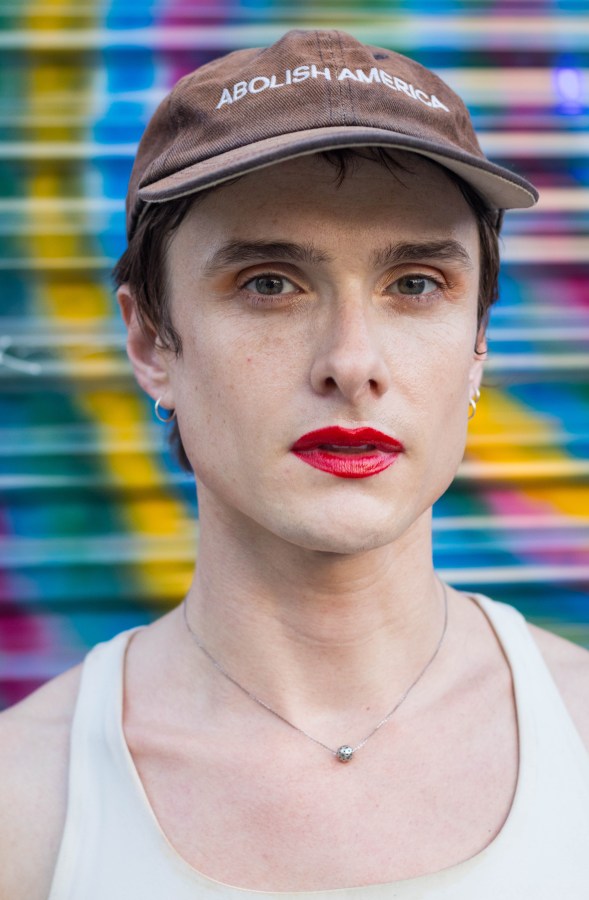

Azani Creeks and Sapphrodite Alexander joined Queer’s Gambit soon after its founding and are now co-captains leading the club alongside Cross.
The club’s mission is to build “a space for queer people to come together and play, but also be intentional about the power of coming together and what we can do together also. So, moving beyond just the club into action,” Creeks tells me.
Queer’s Gambit meets regularly at the queer-owned Brooklyn bar Purgatory to socialize and play chess. The club also hosts beginner chess classes, social picnics, and fundraising events. Members find the space and the game of chess specifically an important way to connect and socialize.
“I can be a pretty shy person, and so it’s really nice to have a game, an activity to meet people and talk to people. And you don’t even necessarily need to talk. But you’re playing this game and you’re still in some kind of relationship with each other for as long as the game lasts, and that’s really, really nice,” Creeks tells me. “It’s portable. I can keep a board on me, go to the beach with it, go to the park with it.”
Creeks adds that it’s nice to find someone who you’re well-matched with. “There’s this sort of tension and electricity when you’re playing,” Creeks says. “I haven’t really experienced it in other board games that I’ve played.”
Alexander agrees that there’s something different about the feeling of playing chess than playing other games, adding that a lot of members of the club are neurodivergent in some way. “And as an autistic, depressed person, Queer’s Gambit is such a refuge for me,” Alexander says. Other nightlife spaces aren’t always accessible or comfortable for people with social anxieties, but as Alexander puts it: “Having a game, an activity to do, that’s very grounding and also a natural social lubricant, where it’s like, wanna play a game? It’s like boom, you’re in it, you are participating.”
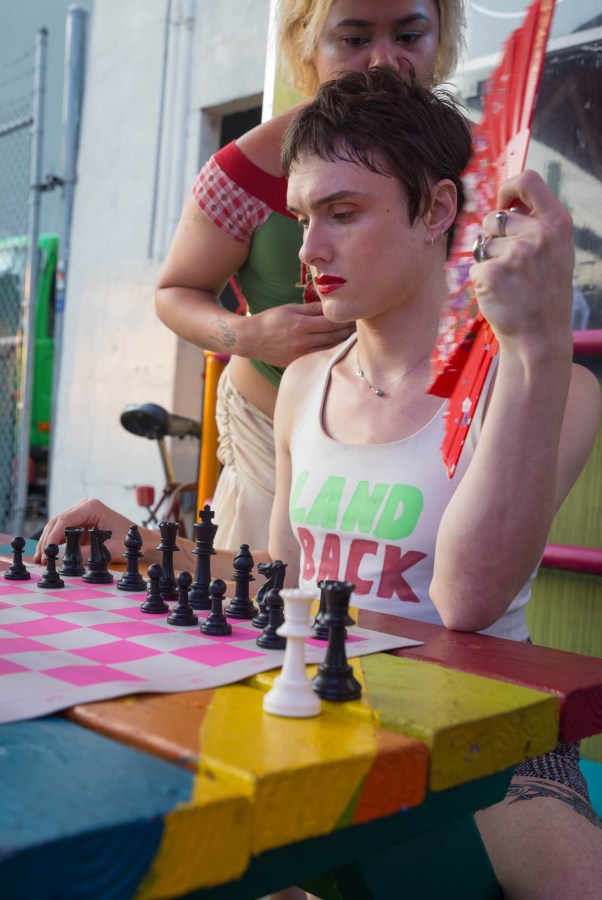
“Our chess club is different in that it’s also queer and trans-led, which is very out of the ordinary,” Alexander adds. “And it’s anti-empire, which is also out of the ordinary.”
Indeed, the group is a social club, but it is also quite involved in local and global political action. This is not in addition to the chess aspect, but rather intertwined with chess as a practice, the captains tell me.
“I think of chess as a sort of plugging into a global practice,” Alexander says. “You think about how many queers have just been like, let me escape into 64 squares, and that will get me through the next period of time. I also think it’s very accessible, you know, anyone can, like, play chess on their phone, there’s boards in the parks, etcetera.”
“Chess itself is such a good metaphor… for lots of different things,” Creeks says. “Sometimes if I’m teaching someone chess, they’ll be like, why does white go first? Chess is a very, very old game, and white didn’t start going first until England standardized it and made it that way… So even the history of chess itself and the way it’s standardized and implemented has imperial implications. It also is really nice to think about how the game itself operates throughout the world.”
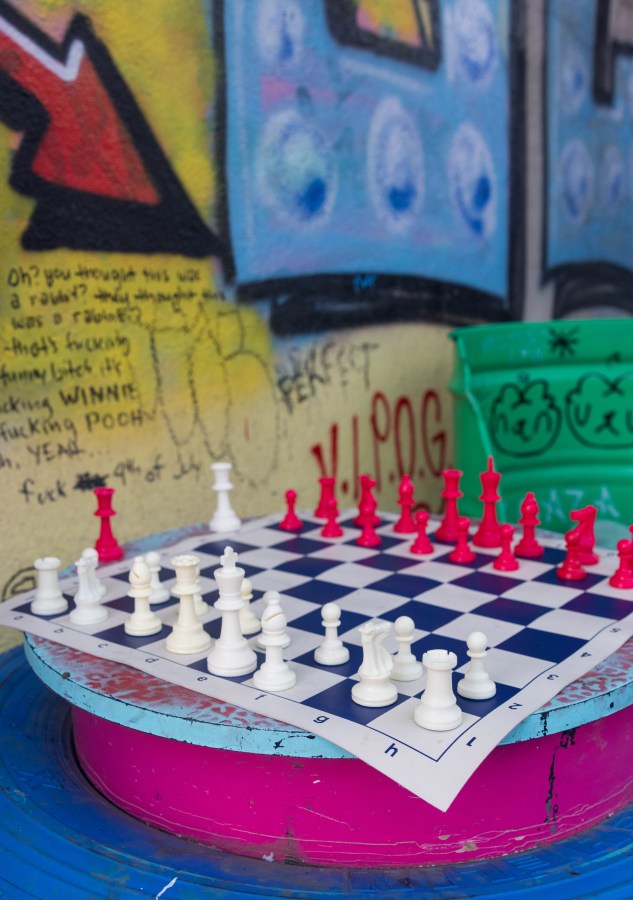

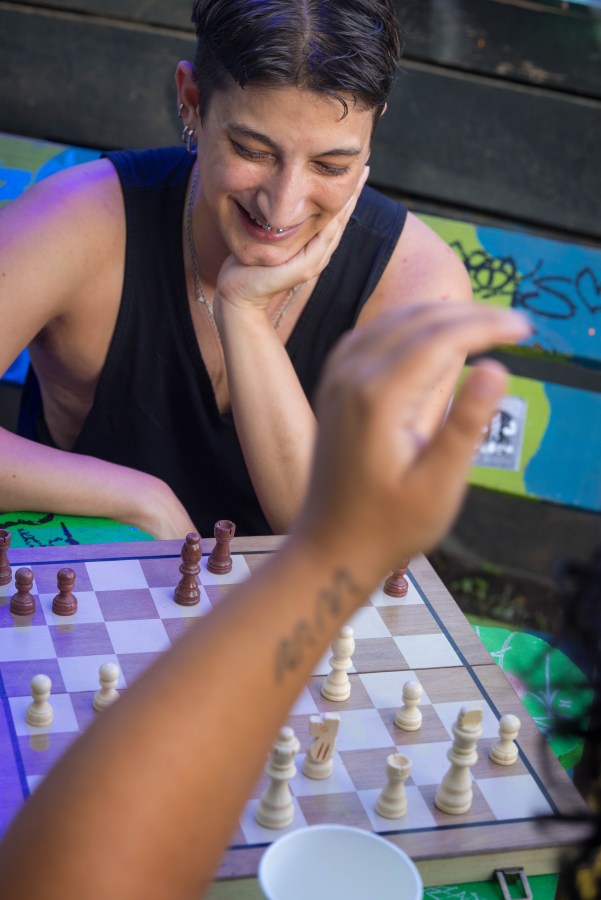
In 2023, the International Chess Federation (FIDE) introduced new anti-trans legislation. The new rules ban transgender women from competing in high-level chess tournaments against cisgender women, claiming they would have an advantage. FIDE has also announced that if a player holds titles in the women’s category and transitions, the player loses those titles.
Queer’s Gambit makes an effort to separate itself from this world of more traditional chess due to this culture. FIDE’s new policy is “just one example of the types of repression and prejudice that trans people face,” Cross explains. “Sexual harassment and abuse are rampant in the chess world also…It’s a kind of violent patriarchal norm in the chess world. There’s always a sense of unwelcome for women and queer and trans people. So we’re building a world outside that.”
“[The ban] is typical cishet patriarchy,” Alexander adds. “Organized chess, in terms of institutional organized chess, is just something that we’re not interested in.”
The club advertises itself as the “queerest anti-imperialist chess club on earth.” When I ask the captains about this, they smile. “It’s very serious, but also a joke,” Cross says. “There are other chess clubs [that say they’re the] ‘hottest chess club in New York,’ and I just thought it would be funny to say queerest and anti-imperialist chess club because we’re probably the only anti-imperial chess club and maybe the only queer chess club in the U.S. So, you know, it’s just a little silly. But we definitely focus on anti-imperialism, and our connections to it and how our repression here, as queer and trans people under the empire, is related to how imperialism functions abroad.”
Queer’s Gambit has always made organizing for queer, trans, and anti-imperial causes a core aspect of the club. At the very first meetings, percentages of the bar tab were donated to Black Trans Liberation. Since then, the club has raised money for various local and global causes, such as gender-affirming surgery funds for club members and evacuation funds in Gaza. Alexander created a zine to raise money for GLITS, a Black trans-led advocacy and direct services organization fighting systemic discrimination against marginalized communities. She has raised over $1100, exceeding the club’s original target.
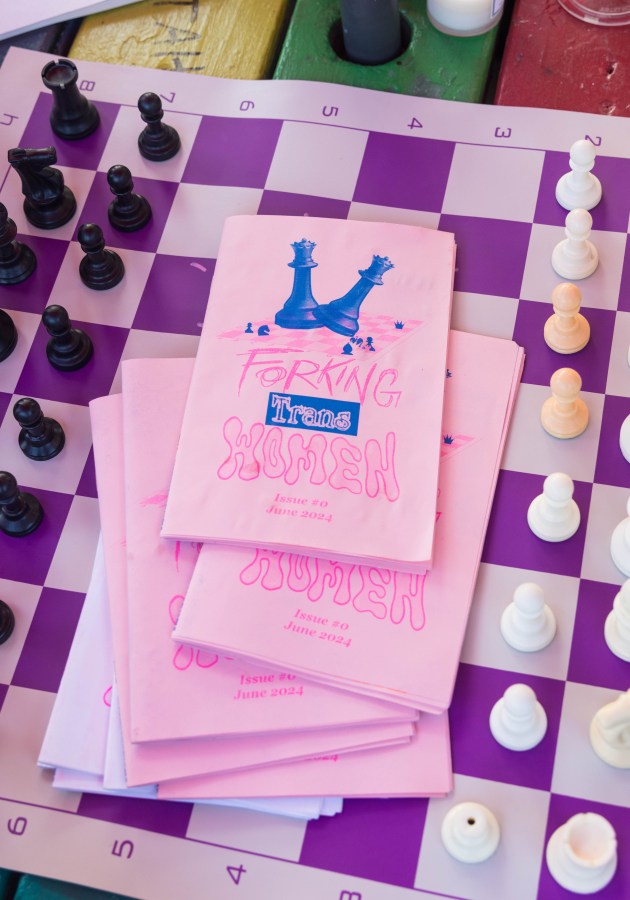
The zine is called “Forking Trans Women,” and Alexander created it with three goals in mind, to “highlight people’s work, raise money for GLITS, and create an archive of queer chess.” Alexander takes submissions from club members alongside her own writing and artwork. The title is inspired by Mira Bellwether’s zine “Fucking Trans Women,” an 80-page zine about trans women and sexuality published in 2010.
“I really want to carry her spirit on through this, as well as invite queer trans chess players [and] be like, hey, submit shit,” Alexander tells me.
Alexander uses the zine as an archive of chess games played at club events, particularly speed or “blitz” games.
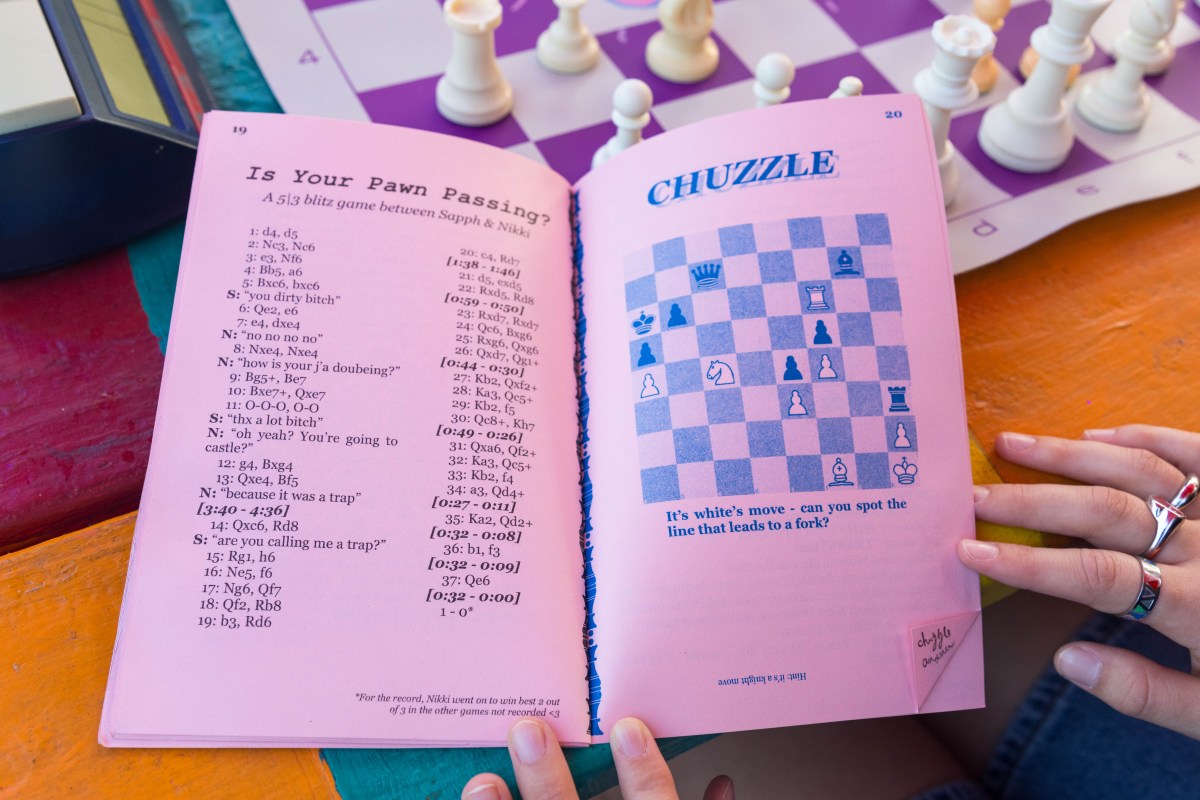
“Niki and I play a lot of speed games,” Alexander explains. “And often when we’re playing, we’ll be like, you slut, you fucking cunt. Usually in British accents for some reason. Slore. Things like that. And so I knew that I wanted to have someone record me and Niki playing a blitz game and have it transcribed… both audio-wise and chess game move-wise and, like, timing of the game.”
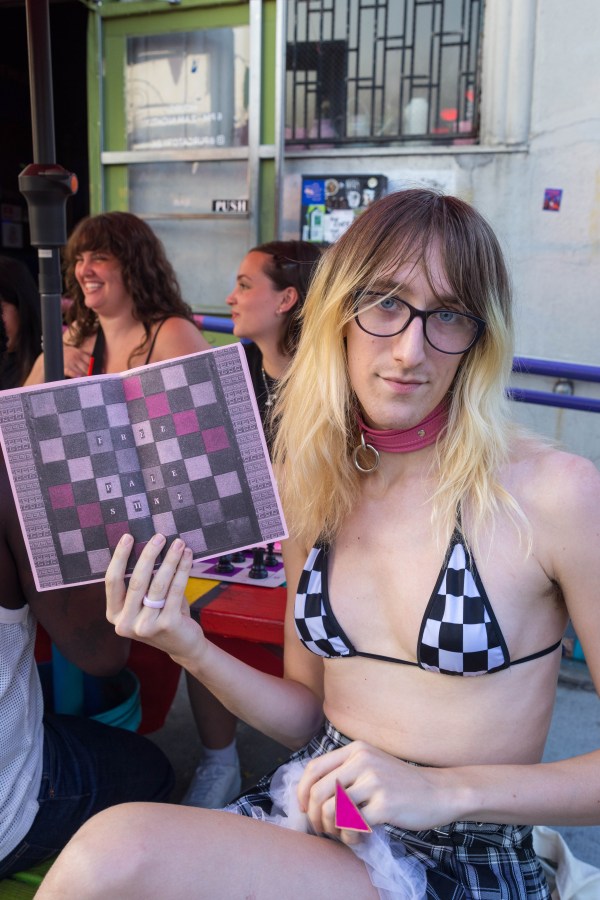
Queer’s Gambit has spent the last few months focusing much of their organizing efforts onsupporting Palestinians. “There’s this gorgeous picture of Palestinians playing chess on the beach,” Creeks says. “It just moved me so much, because, yeah, they should be playing chess on their beach, free from any bombs, any genocide, any horrors that are happening.”
“Sudanese refugees are playing chess in camps just as a way to get by,” Cross says. “Palestinian prisoners before October 7th would play chess and actually would hunger strike for the ability to play chess because, you know, it was a way to stay sane… I think it’s really interesting how [chess] functions as a tool for survival. Here, in the imperial core, we can think more sharply about our own resistance, strategy, and tactics, or coordinating how we’re working together, you know, the same way you get your pieces to coordinate on the board.”
I recently attended one of the biweekly Queer’s Gambit meetings at Purgatory. At these events, attendees can play chess, pick up free condoms, buy zines, and participate in conflict resolution workshops. The club often partners with other organizations to provide community support around health, wellness, and political action. At a recent meeting, they had friends providing logistical support for legal name changes. For the last few months, they have partnered with Project STAY to provide free STI and HIV testing.
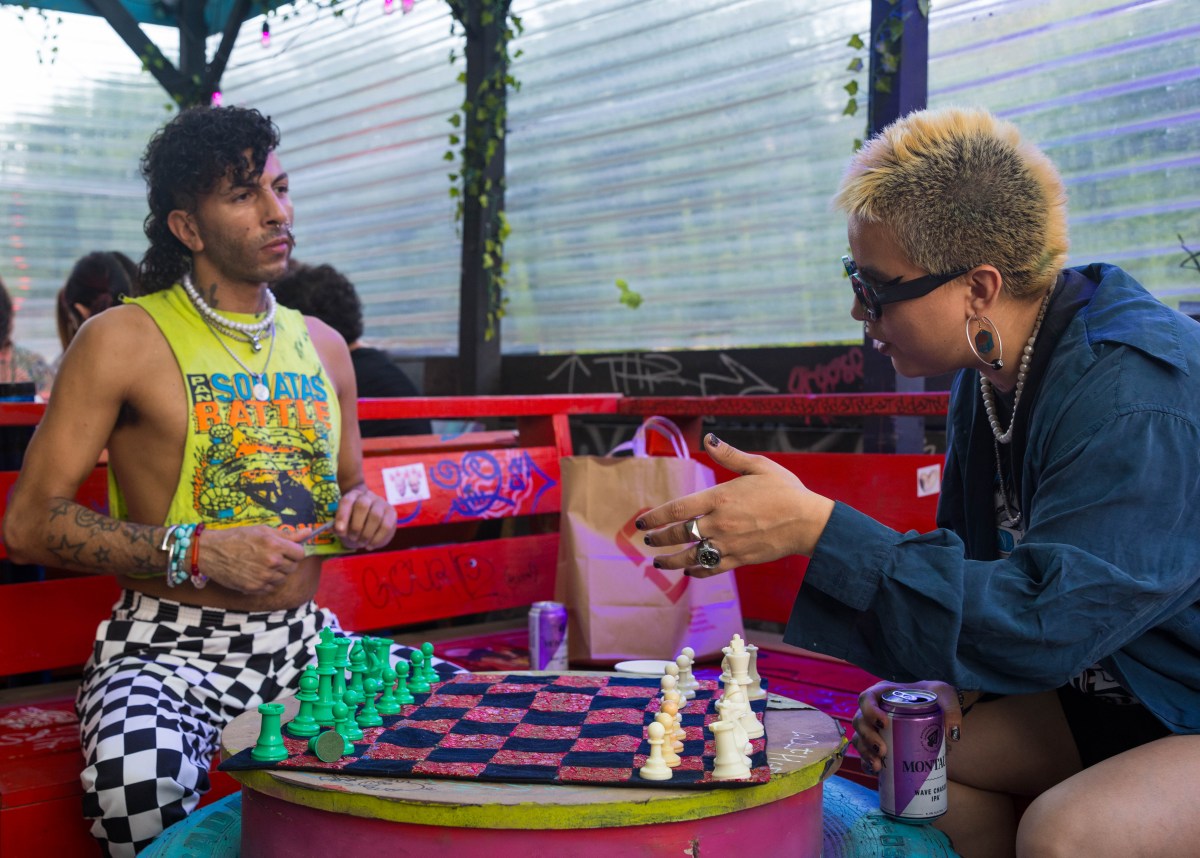
“I love going to queer activities across Brooklyn, but I think one of the things that really sets Queer’s Gambit apart versus other queer activities or sports is that they make an effort to pour into community and into the things that make queerness important, which is liberation,” Queer’s Gambit regular Anesu Nyatanga says. “They’re always hosting opportunities to get involved with direct action around, specifically, Palestine, Gaza, and Sudan. Or they’re offering services that our community needs and has fought for, like free HIV testing or partnering with cool groups who can expose you to stuff like conflict mediation. I just think that that’s at the core of what it means to have queer community… and Queer’s Gambit is really committed to doing that.”
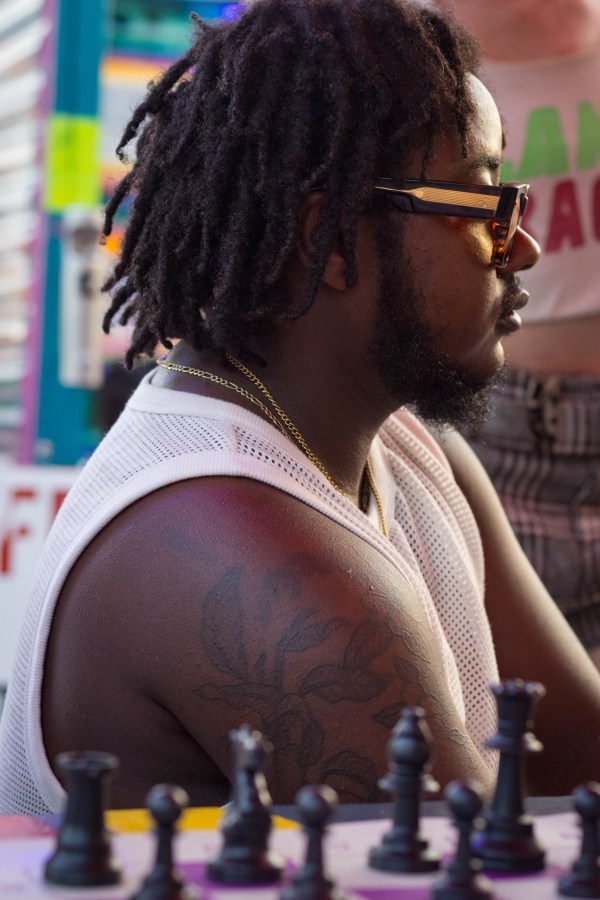
Attendees gathered on the Purgatory patios to play. Some players, like Cross and Alexander, played speed games back to back while others played the traditional long-form game. The club has a crew of loyal regulars attending meetings to make friends and play chess.
“I’ve been in chess on and off, but knowing that there’s a queer space for people like me has really exerted my passion in chess once again,” club member Mara says. “And it’s just really great to know that there’s a community of people like me who are passionate about this hobby, and it’s a great place to meet people, especially queer people. I think it’s really important to have this when chess itself is so male-dominated. A lot of the clubs in New York don’t really have much space for queer people, so this is a great thing to have.”
“Chess is such a male-dominated field, specifically white men, and having a space for queer people just to play and be silly is so important,” Jo, another regular, says. “It just gives us a safe space to come back to what we really love.”
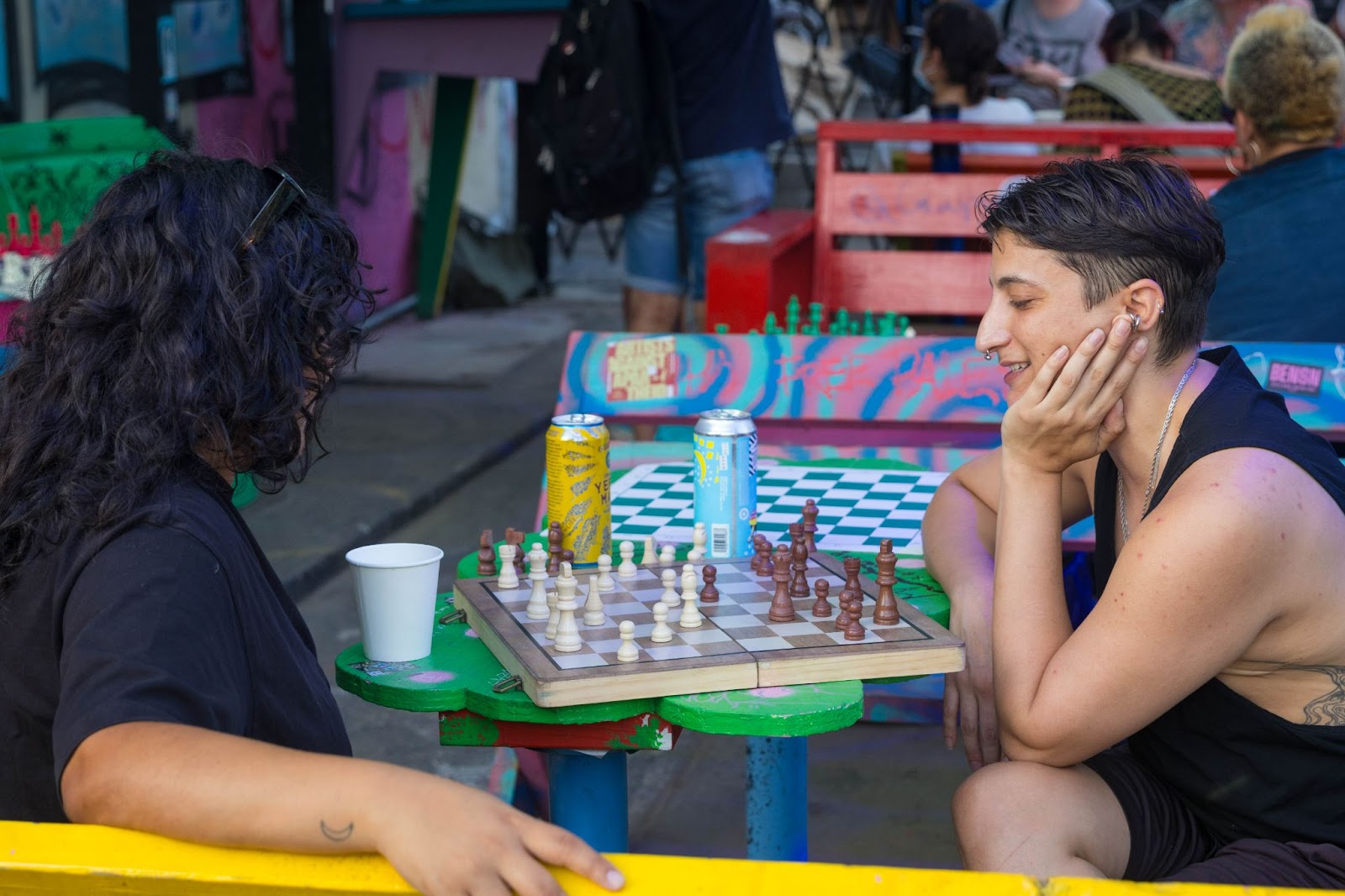
“I used to love chess as a kid, and I think like a lot of sports and activities, it is often dominated by people.. [whose] way of relating to each other that doesn’t feel good,” Nyatanga says. “I like coming here because there are people who are really amazing at chess. And if you wanna play them, they’ll play you with grace or they’ll mop the floor with you, but there’s still a sense of joy and connection that feels really integral to queerness.”
Creeks teaches club newcomers the basics of chess, specifically queer chess. She gave me a quick refresh, then we played against each other with Alexander advising me.
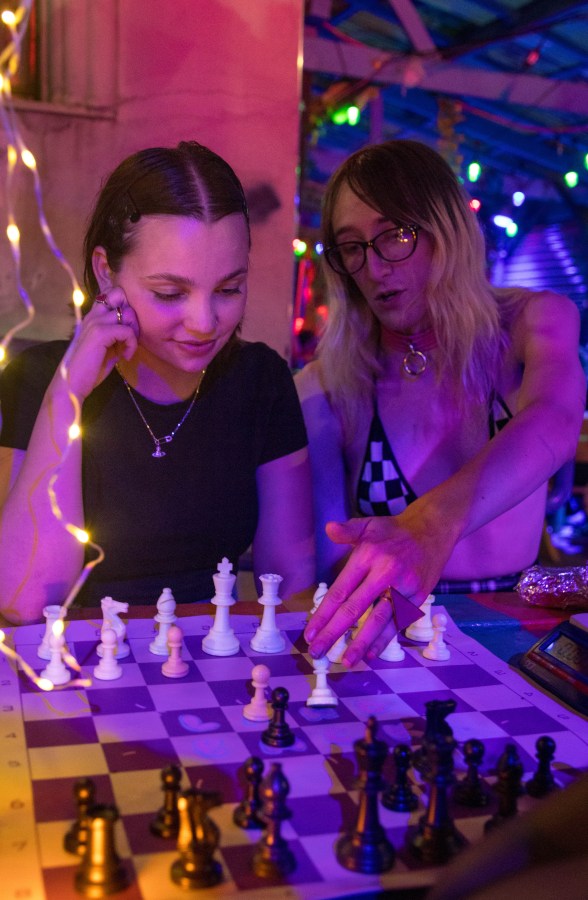
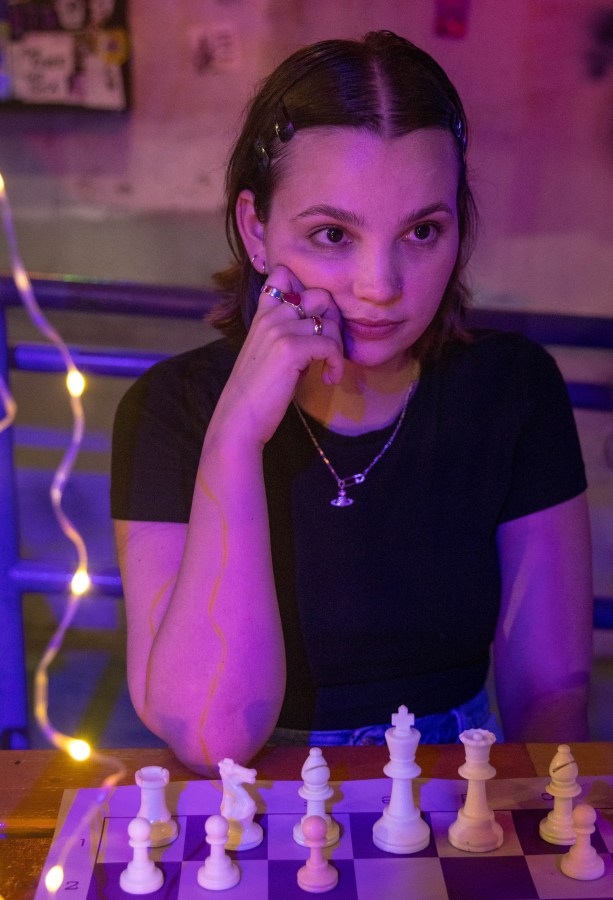
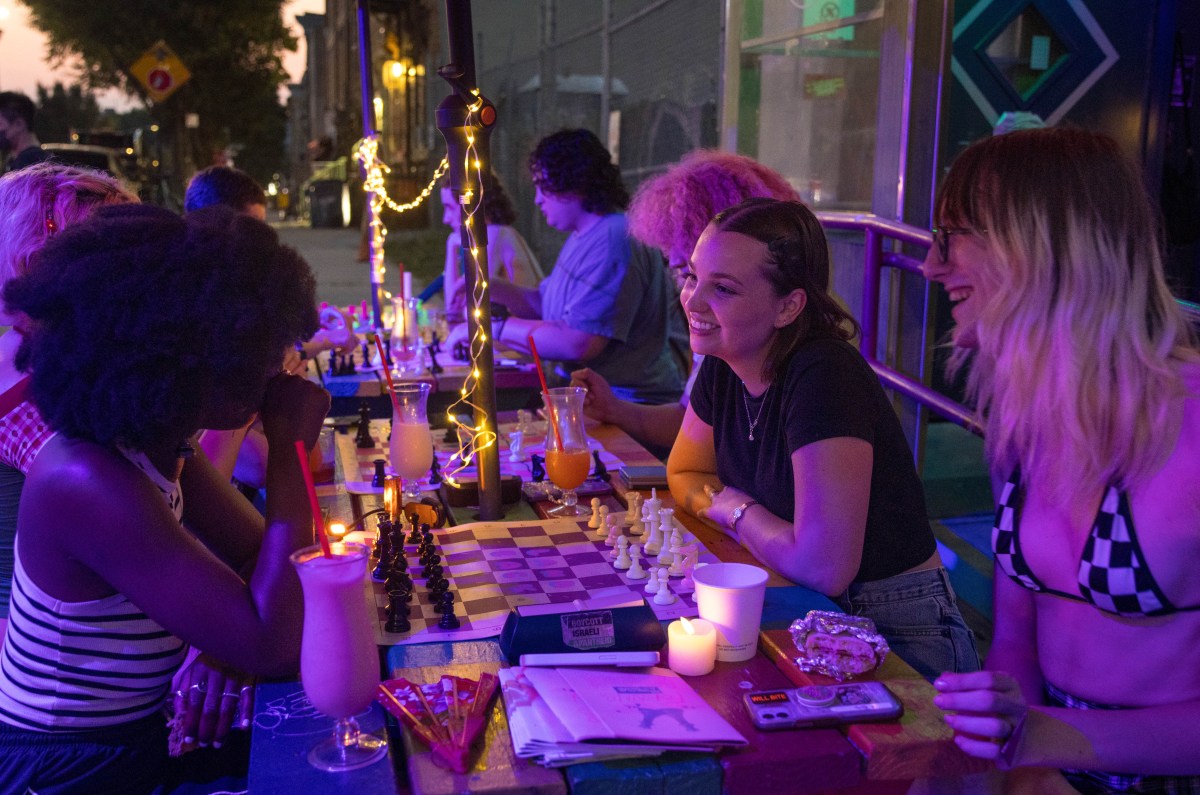
The version of chess played at Queer’s Gambit is an explicitly queer one. “Your pawns are very powerful, and they’re also trans. Because when they reach the end of the board, they turn into queens,” Creeks explains to me as we play.
The captains play with grace and joy as they win, just as Nyatanga describes. Creeks beat me, of course, but also taught me in a fun and engaging way. The club makes an effort to be welcoming to less experienced players; Creeks taught several other newcomers throughout the evening.

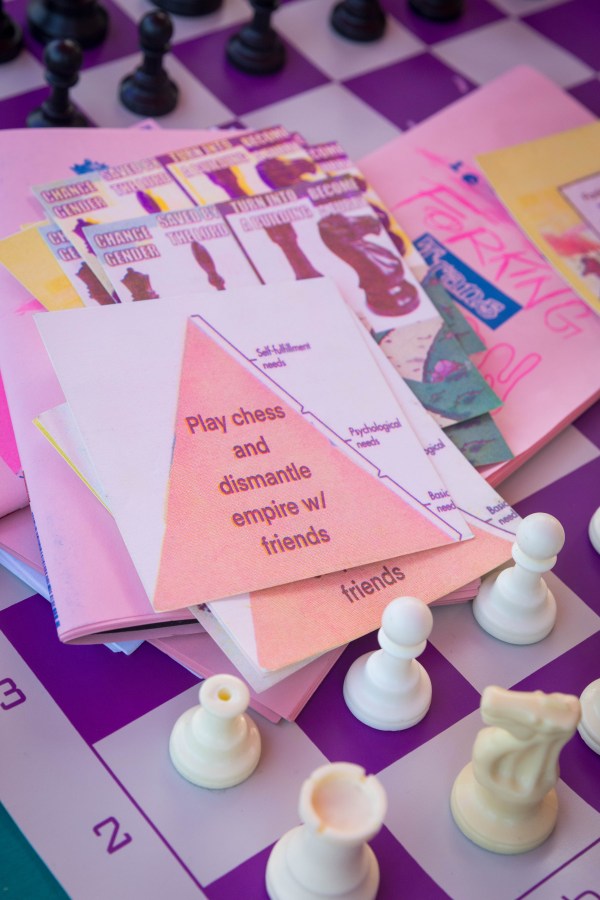
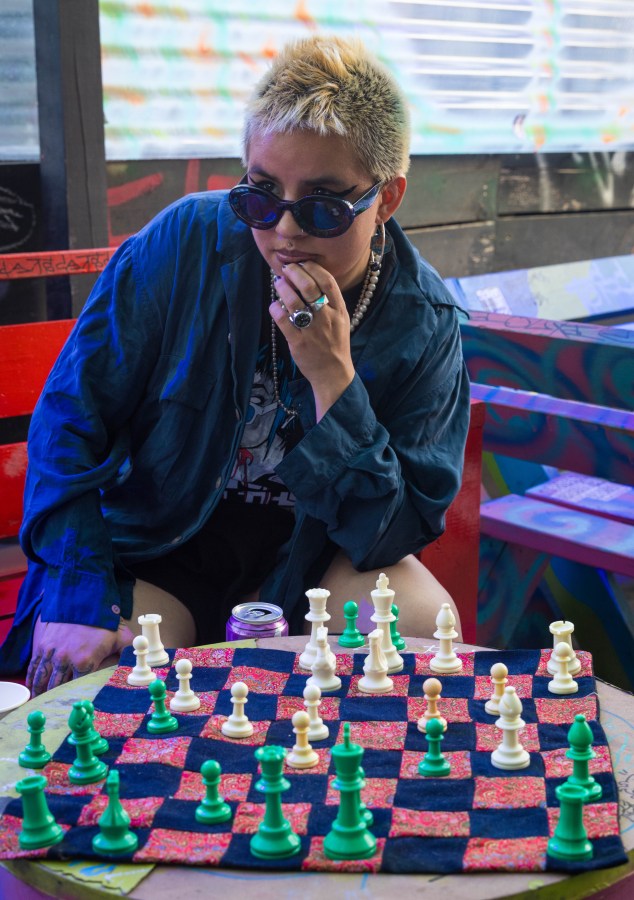
The captains have successfully integrated action around difficult social issues with play and joy, as demonstrated by their event.
“As a club, we see an interconnected cycle of play, rest, organization, action, and how these are all very interconnected steps,” Alexander tells me.
“Cracking ourselves up is actually number one on the list… We laugh a lot. We love to laugh,” Creeks says, laughing as she does. “Laughing and playing chess are the number one things happening.”
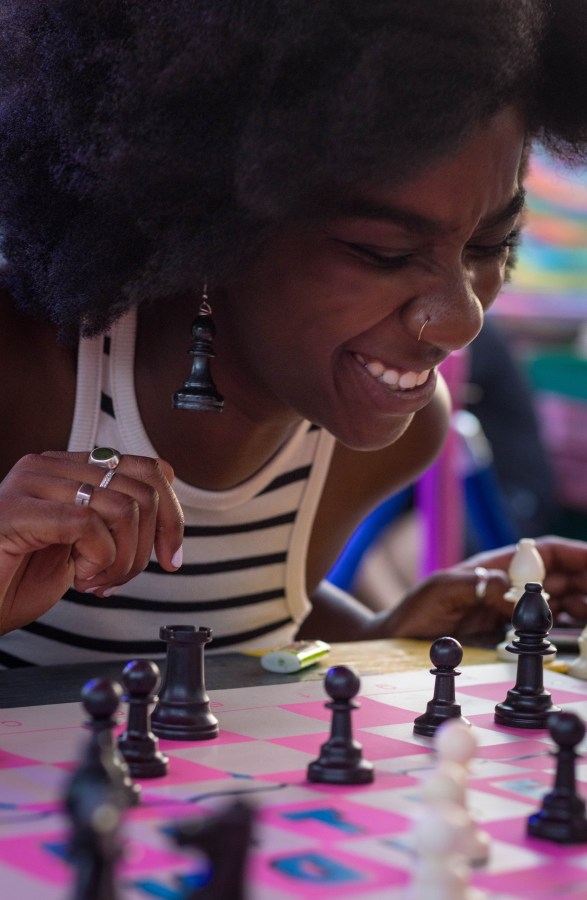
“I think that these types of groups are kind of the social building blocks for how we will best adapt, survive, and care for each other,” Cross says. “It’s how we can skill share, share knowledge, and coordinate, plan together. Play facilitates all of that. It develops creativity, camaraderie, community, joy, and many types of intelligences.”
This spirit of and ethos of play suffuses all of Queer’s Gambit’s interlocking activities, from the chess to the political action to the socializing.
“And queer play, especially in the context of chess, is all the more important,” Cross says. “Because it’s a space where we can affirm each other and reveal and support parts of each other that are repressed or unrecognized in straight spaces, and all through pleasure and joy.”



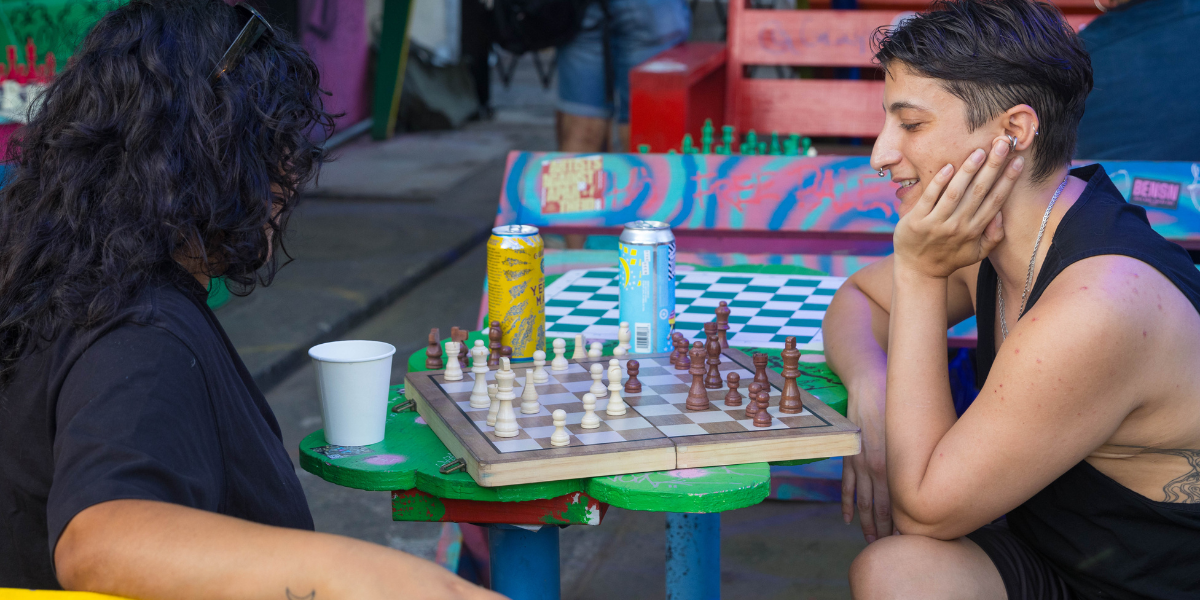




Comments
this post is some thing specialss.
https://leyaiptv.com
this post is exceptional.
my mind information:
How to Download Honista APK
1. Enable Installations: Go to Settings > Security > Enable Unknown Sources.
2.Download: Search for “Honista APK” and download from a trusted site like allhonistaapk.com
3. Install: Open the downloaded file and follow the prompts.
4. Enjoy: Launch Honista from your app list.
Quick Tips
• Use reputable sites.
• Scan for malware.
• Keep your software updated.
(https://allhonistaapk.com/)
this post very intracting
How to Download Stumble Guys
For Android:
1. Open stumbleapps.com:
o Search for “Stumble Guys.”
o Select the game from the search results.
2. Install the Game:
o Tap the Install button.
o Wait for the installation to complete.
3. Open the Game:
o Tap Open or find the game icon in your app drawer.
For iOS:
1. Open stumbleappps.com:
o Search for “Stumble Guys.”
o Select the game from the search results.
2. Download the Game:
o Tap the Get button and then Install.
o Enter your Apple ID password if prompted.
3. Launch the Game:
o Tap Open or find the game icon on your home screen.
For PC:
1. Use an Emulator:
o Download an Android emulator like BlueStacks from its official website.
2. Install the Emulator:
o Follow the on-screen instructions to install BlueStacks.
3. Download Stumble Guys:
o Open BlueStacks and sign in with your Google account.
o Search for “Stumble Guys” in the Play Store within BlueStacks.
o Install and open the game.
Enjoy the Game!
Now you’re ready to enjoy Stumble Guys on your preferred device!
https://stumbleapps.com/
Now why are ALL the comments bots? Came to say I loved this article, I played chess as a kid but havent since primary school – if I was in NYC I’d love this!
Also, saw this is by the same person as the softball article – these have both been GREAT! I hope you commission her for more work!
Amazing
Victoriya, you’re right, check this also: https://stumblegapk.com/
this post is some thing specialss.
https://ilikecix.net/
This is such an inspiring initiative! The Queer Chess Club’s efforts to challenge traditional power structures through the game of chess is both empowering and innovative. It’s amazing to see how communities are using their unique talents to make a statement and create spaces that foster inclusivity.
Amazing thank you for this. https://hobbylobbyhours.us/
This blog is very good. This content will really help me. Thank you for sharing. https://chickfila-menu.us/
I like this site . https://donghuastream.me/
This article beautifully captures the essence of Queer’s Gambit and the importance of creating inclusive spaces within traditionally male-dominated fields like chess. The emphasis on community, joy, and the unique twist of queer chess enhances not only the game but also the social connections among participants. It’s inspiring to see how play can foster creativity and solidarity, providing a safe haven for queer individuals to express themselves and build friendships. A fantastic initiative that highlights the power of chess beyond just competition!
great